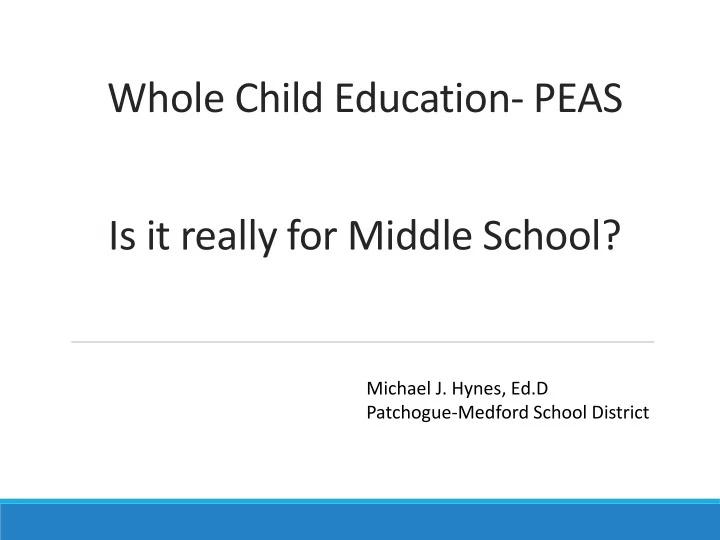

Whole Child Education- PEAS Is it really for Middle School? Michael J. Hynes, Ed.D Patchogue-Medford School District
YES And high school….
Purpose of presentation What is PEAS: Whole Child Education? New Focus for Middle Schools? What are next steps ?
Saw this quote “Don’t just create lessons for students. Create experiences. Students will forget a lesson, but an experience will have a lasting value. We want to do more than cover content. We want to inspire learning.”
What’s our new focus? * Well Being *Create experiences
Vision
Mission
What can we do to support this?
Wrong Paradigm
Students are not standardized
We are gardeners…
No ranking and sorting children… Not true for students, teachers, administrators ….
BALANCE
Developed a 5 year plan
Focus last 4 years have been on: Elementary
Elementary Philosophical Shifts Double recess Project based learning Social/emotional needs Increase play Staff training with the Big 5 Yoga/meditation
Play, Recess, Yoga and Mindfulness…it’s just the start
Dr. Peter Gray: The importance of play
What can we do DIFFERENT at the MS level? Need you to keep an open mind Need you to TRUST Need you to welcome the possibility of being uncomfortable
Sorting and ranking kids: Why must we have tracks in school? Why do some of the best school systems in the world have no tracking at the secondary level? Many middle schools on Long Island don’t Countries that are ranked (not that I care) in the top 5 internationally don’t have sorting and ranking (Singapore and Finland)
Assessments How many times do we test/assess kids in a week? How many times do we test/assess kids in a month? How many times do we test/assess kids in a year? WHY do we assess them so often? Are they mostly quizzes and multiple choice tests? How many of our assessments are project/portfolio based?
Exploratory How do kids know what like and may be interested in? How will they know what they may be good at?
Yoga/Mindfulness This is not a waste of time This is as important as ELA, Math, SS and Science
Recess Do all students have opportunity? What are they doing? Is it student led?
Play evolved – to promote survival. Play makes the brain smarter - more adaptable - higher animals. Play is the basis of social contact and group interaction - fostering empathy – The core of creativity and innovation. Play gives us the ability to become smarter and more creative, to learn more about the world than the genes could ever teach, to adapt to a changing world. In a world of continuously presenting unique challenges and ambiguities.. Play Prepares the Player to cope with the evolving planet. The more recess… the better behaved and attentive the student or worker.
Play in TIME magazine In classrooms across the country, the countdown to summer vacation has begun. The winter doldrums have always taken a toll, but in the era of test-dominated schooling and the controversial Common Core, it seems increasingly that it’s not until summer that teenagers have any prospect for having fun any more. One of the casualties of current education reform efforts has been the erosion of play, creativity, and joy from teenagers’ classrooms and lives, with devastating effects. Researchers have documented a rise in mental health problems — such as anxiety and depression — among young people that has paralleled a decline in children’s opportunities to play. And while play has gotten deserved press in recent months for its role in fostering crucial social-emotional and cognitive skills and cultivating creativity and imagination in the early childhood years, a critical group has been largely left out of these important conversations. Adolescents, too — not to mention adults, as shown through Google’s efforts — need time to play, and they need time to play in school.
In order for a man to succeed in life, God provided him with two means, education and physical activity. Not separately, one for the soul and the other for the body, but for the two together. With these two means, man can attain perfection.
Spark: Kids (especially MS kids) Need to MOVE often
The Association between School-Based Physical Activity, including Physical Education, & Academic Performance A CDC REPORT, APRIL 2010 ?
Social and Emotional support This is just as important as any content area Students need to be involved in after school activities Relationships are vital
School Environment Furniture Lighting Things for students to do Breaks for kids(and adults)
Importance of school environment- extension of home
Café spaces
Let Grow Project
P.E.A.S. Physical growth + Emotional growth + Academic growth + Social growth = Human Potential
PEAS TREE
New Pat-Med Paradigm
PEAS
Recommend
More recommend